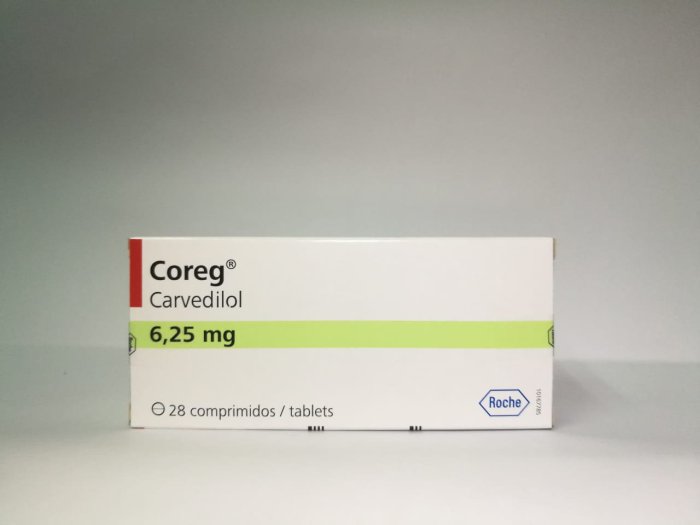Coreg, also known as carvedilol, is a medication used to treat various cardiovascular conditions. It works by blocking certain receptors in the body, leading to a decrease in blood pressure and improved heart function. This medication is commonly prescribed for heart failure, high blood pressure, and other cardiovascular issues.
Coreg is available in different forms, including tablets and oral solutions, with dosages varying depending on the individual’s condition and response to treatment. While Coreg offers significant benefits for managing cardiovascular health, it’s crucial to understand its potential side effects and risks.
Coreg
Coreg, also known by its generic name carvedilol, is a medication that belongs to a class of drugs called beta-blockers. Beta-blockers work by blocking the effects of certain natural chemicals, like adrenaline, on the heart. These chemicals can cause the heart to beat faster and with more force, which can be problematic for people with certain heart conditions. Coreg helps to control these effects by slowing down the heart rate and reducing the force of the heart’s contractions.
Uses of Coreg
Coreg is prescribed to treat a variety of cardiovascular conditions, including:
- Heart failure: Coreg can help to improve the symptoms of heart failure, such as shortness of breath, fatigue, and swelling in the legs and ankles. It works by reducing the workload on the heart and improving its ability to pump blood effectively.
- High blood pressure: Coreg can lower blood pressure by relaxing the blood vessels and allowing blood to flow more easily. This can help to reduce the risk of stroke, heart attack, and other cardiovascular problems.
- Other cardiovascular issues: Coreg can also be used to treat other cardiovascular conditions, such as chest pain (angina), irregular heartbeat (arrhythmia), and certain types of heart valve problems.
Forms and Dosages of Coreg
Coreg is available in several forms, including:
- Tablets: Coreg tablets come in various strengths, and the dosage will depend on the specific condition being treated and the individual’s needs.
- Oral solution: Coreg oral solution is a liquid form of the medication that is often used for patients who have difficulty swallowing tablets.
The dosage of Coreg will vary depending on the condition being treated, the individual’s age and weight, and other factors. It is important to follow the doctor’s instructions carefully and to take the medication exactly as prescribed.
Benefits and Risks of Coreg

Coreg (carvedilol) is a medication used to treat various heart conditions, including high blood pressure, heart failure, and chest pain (angina). It works by blocking certain chemicals in the body that can cause blood vessels to constrict, thereby lowering blood pressure and improving heart function. Like all medications, Coreg has potential benefits and risks that should be carefully considered before taking it.
Potential Benefits of Coreg
Coreg can provide several benefits for individuals with specific heart conditions.
- High Blood Pressure: Coreg effectively lowers blood pressure, reducing the risk of complications such as stroke, heart attack, and kidney disease.
- Heart Failure: Coreg improves heart function by reducing the workload on the heart, leading to better blood flow and reduced symptoms like shortness of breath, fatigue, and swelling in the legs and feet.
- Chest Pain (Angina): Coreg can reduce the frequency and severity of angina episodes by improving blood flow to the heart muscle.
Potential Risks and Side Effects of Coreg
While Coreg can be effective in managing heart conditions, it’s important to be aware of potential risks and side effects.
- Common Side Effects: These may include dizziness, fatigue, headache, diarrhea, and nausea. Most of these side effects are mild and tend to resolve over time.
- Serious Side Effects: Although less common, serious side effects can occur. These may include:
- Slow Heartbeat: Coreg can slow the heart rate, which may be dangerous for individuals with certain heart conditions.
- Low Blood Pressure: Coreg can cause a sudden drop in blood pressure, leading to dizziness, fainting, or lightheadedness.
- Liver Problems: In rare cases, Coreg can cause liver damage.
- Breathing Problems: Some individuals may experience shortness of breath or wheezing while taking Coreg.
- Depression: There is a potential association between Coreg and depression, though more research is needed to confirm this link.
Monitoring for Adverse Reactions
It’s crucial to monitor for any adverse reactions while taking Coreg. If you experience any unusual symptoms, such as chest pain, shortness of breath, dizziness, or swelling, seek immediate medical attention. Regular check-ups with your doctor are essential to ensure the medication is working effectively and to monitor for any potential side effects.
Coreg Interactions and Contraindications

It’s crucial to inform your healthcare provider about all medications you are taking, including over-the-counter drugs, herbal supplements, and vitamins. This is because Coreg can interact with other medications, potentially leading to adverse effects.
Potential Drug Interactions
Certain medications can affect the way Coreg works in your body, or Coreg can affect the way other medications work. This can lead to increased or decreased levels of Coreg or other medications in your blood, potentially causing unwanted side effects. It’s important to be aware of potential interactions and discuss them with your doctor.
- Medications that can increase Coreg levels in the blood:
- Certain antibiotics (e.g., erythromycin, clarithromycin)
- Certain antifungals (e.g., ketoconazole, itraconazole)
- Certain HIV medications (e.g., ritonavir)
- Medications that can decrease Coreg levels in the blood:
- Certain anticonvulsants (e.g., phenytoin, carbamazepine)
- Certain herbal supplements (e.g., St. John’s wort)
- Medications that can increase the risk of side effects when taken with Coreg:
- Other medications that lower blood pressure (e.g., ACE inhibitors, diuretics)
- Medications that slow the heart rate (e.g., beta-blockers)
- Medications that can cause heart problems (e.g., certain chemotherapy drugs)
Contraindications
Coreg is not suitable for everyone. Certain conditions or situations may make it unsafe to use Coreg.
- Severe heart failure: Coreg can worsen heart failure in some individuals.
- Slow heart rate (bradycardia): Coreg can further slow down the heart rate, which can be dangerous.
- Severe asthma or lung disease: Coreg can worsen breathing problems in individuals with severe asthma or lung disease.
- Severe liver disease: Coreg can be processed by the liver, and severe liver disease can affect its metabolism.
- Certain types of heart block: Coreg can worsen heart block, a condition where the electrical signals in the heart are disrupted.
- Pregnancy: Coreg is not recommended for use during pregnancy, as it can harm the developing fetus.
- Breastfeeding: Coreg passes into breast milk and can harm a nursing infant.
Managing Potential Interactions
To ensure safe use of Coreg, it’s essential to:
- Inform your healthcare provider about all medications you are taking. This includes prescription drugs, over-the-counter medications, herbal supplements, and vitamins.
- Be aware of potential drug interactions. Discuss any concerns with your doctor.
- Monitor your blood pressure and heart rate regularly. This helps to detect any potential problems.
- Report any side effects to your doctor. Side effects can range from mild to severe.
Coreg and Patient Education

Understanding your medication is essential for effective treatment and overall well-being. This section will provide you with crucial information about Coreg, helping you make informed decisions about your health.
Key Information for Patients Taking Coreg
This table summarizes important information for patients taking Coreg, including dosage, potential side effects, and important precautions.
| Information | Details |
|---|---|
| Dosage | The dosage of Coreg will vary depending on your individual needs and medical condition. Your doctor will determine the appropriate dosage for you. |
| Potential Side Effects | Common side effects of Coreg include dizziness, fatigue, headache, and slow heart rate. More serious side effects are possible, such as shortness of breath, chest pain, and swelling in the legs or feet. It’s crucial to report any unusual symptoms to your doctor immediately. |
| Important Precautions | Coreg may interact with other medications, so it’s important to inform your doctor about all medications you are taking, including over-the-counter drugs and herbal supplements. You should also inform your doctor about any allergies or medical conditions you have. |
Patient Education Pamphlet
This pamphlet provides essential information about Coreg therapy, emphasizing patient understanding and adherence.
- What is Coreg? Coreg (carvedilol) is a medication that belongs to a class of drugs called beta-blockers. It is used to treat high blood pressure, heart failure, and other heart conditions. It works by blocking the effects of certain natural chemicals in your body, such as adrenaline, which can cause your heart to beat faster and your blood vessels to narrow.
- How does Coreg work? Coreg helps to lower blood pressure by relaxing blood vessels and slowing down your heart rate. It also helps to improve the pumping action of your heart in patients with heart failure.
- How should I take Coreg? Take Coreg exactly as prescribed by your doctor. Do not take more or less than the prescribed dose. You should take Coreg at the same time each day, either with or without food. It’s important to take Coreg regularly, even if you feel well. Do not stop taking Coreg without talking to your doctor.
- What if I miss a dose of Coreg? If you miss a dose of Coreg, take it as soon as you remember. However, if it is almost time for your next dose, skip the missed dose and take your next dose at the regular time. Do not double the dose to make up for a missed dose.
- What are the possible side effects of Coreg? Coreg can cause side effects, but not everyone experiences them. Common side effects include dizziness, fatigue, headache, and slow heart rate. More serious side effects are possible, such as shortness of breath, chest pain, and swelling in the legs or feet. It’s crucial to report any unusual symptoms to your doctor immediately.
- What should I avoid while taking Coreg? Avoid alcohol while taking Coreg, as it can increase the risk of side effects. You should also avoid driving or operating machinery until you know how Coreg affects you. If you experience dizziness or lightheadedness, it’s important to sit or lie down until the symptoms pass.
- What should I do if I experience a side effect? If you experience any side effects, contact your doctor immediately. They can advise you on the best course of action.
- How do I store Coreg? Store Coreg at room temperature, away from light and moisture. Keep Coreg out of reach of children and pets.
- Is Coreg safe for pregnant women? It’s important to discuss the risks and benefits of taking Coreg during pregnancy with your doctor. Coreg can pass into breast milk, so it’s also important to discuss this with your doctor if you are breastfeeding.
Frequently Asked Questions about Coreg
This section addresses common patient concerns and inquiries about Coreg.
- Can I stop taking Coreg suddenly? No, you should not stop taking Coreg suddenly without talking to your doctor. Stopping Coreg abruptly can lead to serious health problems, such as a rapid increase in blood pressure or a heart attack. Your doctor will gradually reduce your dose of Coreg before you stop taking it completely.
- Can I take Coreg with other medications? It’s important to inform your doctor about all medications you are taking, including over-the-counter drugs and herbal supplements. Coreg can interact with other medications, so it’s crucial to discuss this with your doctor before taking any new medications.
- Will Coreg make me gain weight? Coreg does not typically cause weight gain. However, if you experience any changes in your weight while taking Coreg, it’s important to discuss this with your doctor.
- How long will I need to take Coreg? The length of time you will need to take Coreg will depend on your individual condition and response to treatment. Your doctor will determine the best course of treatment for you.
- What if Coreg doesn’t work for me? If Coreg doesn’t work for you, your doctor may recommend a different medication. It’s important to discuss your concerns with your doctor so they can find the best treatment for you.
Coreg can be a valuable tool in managing cardiovascular health, but it’s important to use it responsibly and under the guidance of a healthcare professional. By understanding the benefits, risks, and potential interactions of Coreg, patients can work with their doctors to create a safe and effective treatment plan. Lifestyle modifications, such as a healthy diet, regular exercise, and stress management, can further enhance the effectiveness of Coreg therapy.
Coreg, a medication commonly prescribed for heart conditions, can sometimes lead to unexpected legal challenges. If a patient experiences complications related to Coreg use while participating in sports, they may need to consult with a sports lawyer to understand their rights and options. Understanding the legal aspects of sports-related injuries and medication side effects can be crucial in navigating complex situations, and a sports lawyer can provide invaluable guidance and support in these cases.